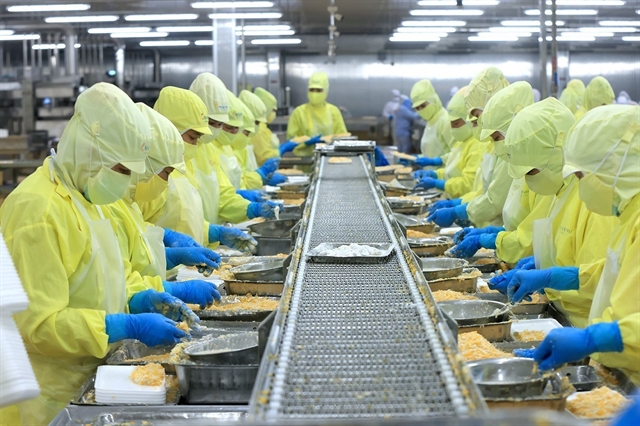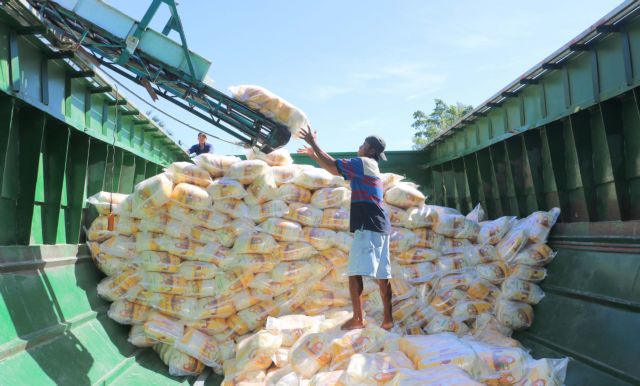Data from ITC's Trade Map showed that some important export products of Việt Nam are holding the top position in the UK market, including pepper, shelled cashew nuts, footwear and coffee.

HÀ NỘI — Trade experts have suggested that Vietnamese exporters should have strategies and approaches to UK market information and trade partners to tap into this lucrative market more effectively.
Over three years after the United Kingdom-Việt Nam Free Trade Agreement (UKVFTA) took effect, two-way trade between the two countries saw an average growth rate of 8.9 per cent.
During the period, Việt Nam's exports to the UK grew by an average of 9.4 per cent, much higher than the overall growth of Việt Nam's exports, Vũ Việt Thành from the European-American Market Department under the Ministry of Industry and Trade.
Notably, Việt Nam saw a trade surplus of US$5.1 billion with the UK in the past nine months of this year, up 24 per cent year-on-year, Thanh told a recent conference in Hà Nội.
Data from ITC's Trade Map showed that some important export products of Việt Nam hold the top position in the UK market, including pepper, shelled cashew nuts, footwear, and coffee. Meanwhile, Vietnamese seafood ranks fifth, and garments rank sixth in terms of market share.
Last year, many additional agricultural products of Việt Nam were allowed to be officially sold in the UK, including oranges, pomelo, lychee, and durian.
Deputy Secretary General of the Vietnam Association of Seafood Exporters and Producers (VASEP) Nguyễn Hoài Nam, said that thanks to the preferential tax rate in the British market, so far, shrimp products account for 70 per cent of the total turnover of Vietnamese seafood exported to the UK, followed by tra fish products at 20 per cent.
Increasing business access to market information
However, according to the Việt Nam Trade Office in the UK, the country accounted for a very modest share of the UK’s total imports every year, estimated at just 1 per cent. One of the reasons was that Vietnamese enterprises failed to have effective strategies and approaches to UK market information and trade partners.
Former Trade Counsellor of the Vietnamese Embassy in the UK Nguyễn Cảnh Cường, agreed. He said that some Vietnamese businesses, especially young ones, have used new digital technology to seek market information and advertise their products on digital-based platforms.

But many firms still failed to take the initiative in researching and updating market information, even the smallest ones, Cường said, adding that some others had yet to draw up measures to approach the UK market effectively despite having good quality products.
The former trade counsellor said that many Vietnamese companies have encountered challenges in systematically searching and analysing information from foreign sources despite the availability of many free-of-charge sources of information about UK enterprises such as the website companieshouse.gov.uk.
He also emphasised the importance of frequently updating the financial status of trade partners, including traditional ones to avoid putting themselves in risky situations and suffering great losses.
Cường said he once knew a case of a Vietnamese firm that failed to keep up with changes in its partner's financial capacity even though they had worked for them for around 10 years, establishing a good trade partnership. That firm delivered goods first and expected to receive payment later as usual. Not knowing that its partner was about to go bankrupt, the firm put itself in a situation of great loss and very high risk.
He said businesses needed support from authorities to improve the effectiveness of the market approach strategy and increase business access to market information.
Sharing Cường's opinion, Thành from the European-American Market Department suggested companies study and verify the market information carefully via various official sources, including two e-portals of the Ministry of Industry and Trade: https://goglobal.moit.gov.vn/ and http://connectviet.moit.gov.vn/.
A radical strategy for market expansion should be developed based on market studies to be able to take advantage of the trade deal, expand exports, and increase added value, he stressed. Enterprises also needed to closely upgrade new regulations of the UK market to avoid problems and make appropriate preparations.
Increasing the application of science and technology was also important to create a competitive advantage for Vietnamese products in the market, he noted.
Thành affirmed that his department would continue to increase the provision of market information while working to raise awareness of sustainable development, green production, and trademark building.
It would continue to work with trade partners to remove trade barriers and strengthen trade promotion to bring more Vietnamese products to distribution chains and the world's leading purchasing groups.
Strengthening cooperation mechanisms to remove market barriers and reducing cost burdens on enterprises, as well as clarifying regulations to help Vietnamese firms develop an appropriate strategy and roadmap for market expansion would be also included, Thành said.
More efforts needed
Besides improving the effectiveness of the market approach strategy, Vietnamese firms should attach special attention to several issues to foster their exports to the market, Cường suggested.
First, Vietnamese firms needed to study the market requirements carefully, especially those developed by the British Standards Institution (BSI), to be prepared and to take advantage of opportunities arising from the trade pact.
They should be aware of the trends including sustainable and environmentally-friendly consumption, emission reduction and climate change. These were already integrated into the UK’s trade policy, engraved in the awareness of importers and consumers.
The other factor was to ensure transparency in the supply chain and origin traceability, Cường said. — VNS





